#bd all result
Text
#all result bd#all result bd all board#bd all result#bd exam result#bd psc result#bd result#bd results#bd results 24#digital marketing#education board result
0 notes
Text
#I want to like- make their results less anglocentric on the BD polls#at least a little bit yknow#but idk if the ppl me following wanna see all these polls
3 notes
·
View notes
Text
Inadvertently discovered the funniest thing.
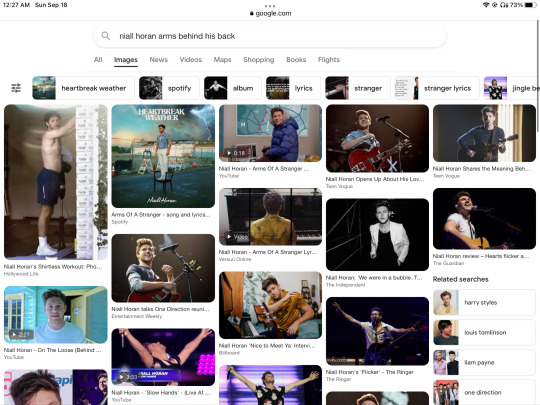
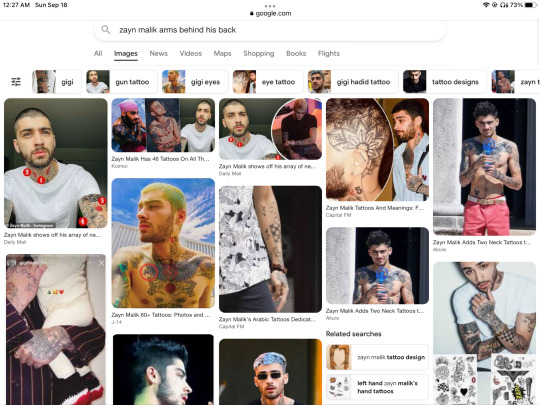
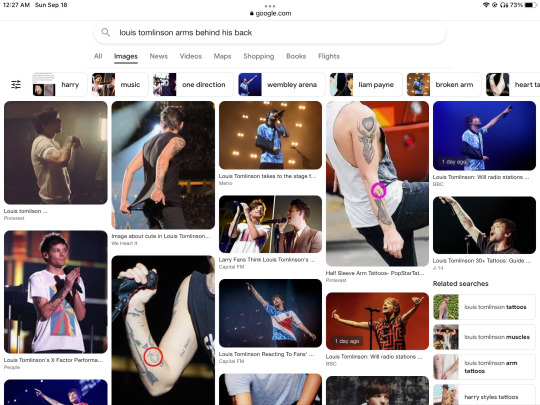
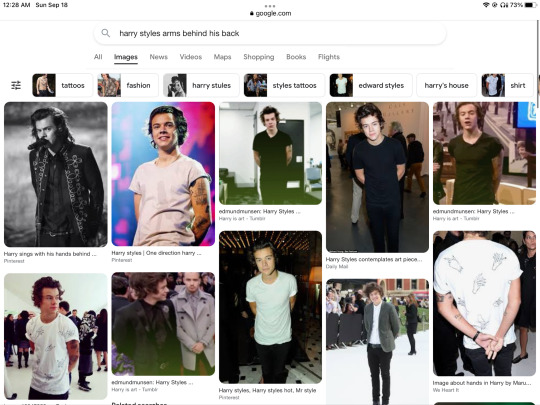
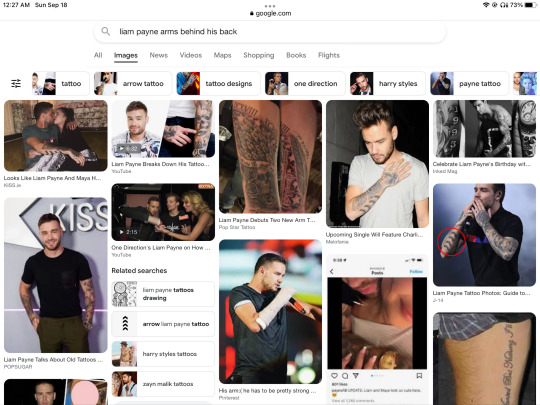
One of these is not like the others~ One of these things is a sub.
#yes I know there are times the others put their arms behind their back#I was looking for examples to compare how you can stand differently for the last ask I hate#had*#strictly to prove that all the boys stand with their hands behind their back in a non-bds#m way#also yes I know these results are tailored to what google has mined for me and others might have different results#but this is still objectively absolutely fucking hilarious#given that since Niall liam and zayn would theoretically be neutral to the google overlords#their results should be unbiased and still there are no examples that stand out#almost as if none exist
17 notes
·
View notes
Text
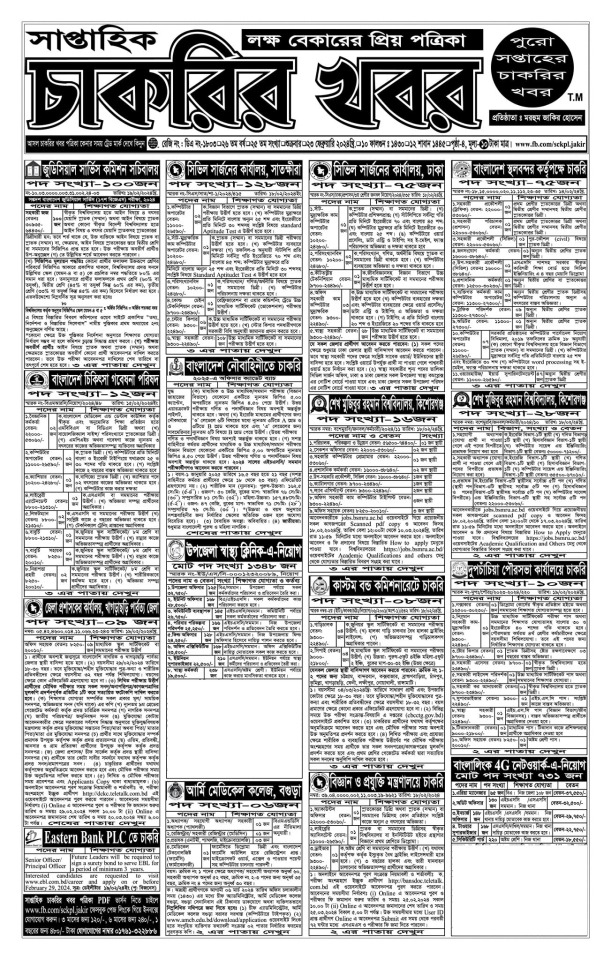
চাকরির খবর:
আপনারা যারা চাকরির প্রস্তুতি নিচ্ছেন। তারা হয়তবা ভালো করে জানবেন যে প্রতি শুক্রবারে ”সাপ্তাহিক চাকরির খবর পত্রিকা” প্রকাশিত হয়। Read More…
#bd job circular#bdjobs#all bd jobs circular#government job circular#govt job circular#latest job circular#government job circular-2023#bangladesh police circular#bangladesh police job#bangladesh police job circular#saptahik job circular#weekly job newspaper#job result today
0 notes
Text
Exploring Bangladesh's Educational Development: From Tradition to Revolution
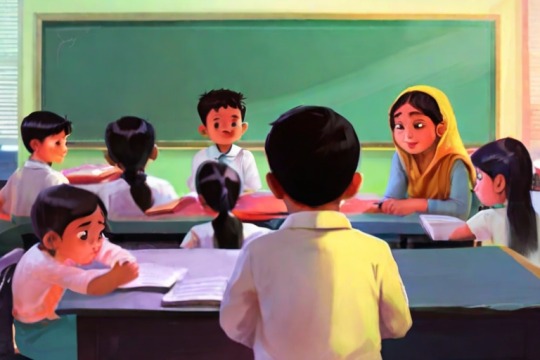
Education in Bangladesh has undergone a profound evolution, shaped by historical, socio-economic, and technological factors. From its traditional roots to the modern era of digitization, this article delves into the multifaceted journey of education in Bangladesh, highlighting key milestones, challenges, and the transformative impact of technology on the educational landscape.
I. Historical Foundations: Traditional Education Systems
Bangladesh has a rich history of traditional education systems deeply rooted in cultural and religious practices. The Madrasa system, dating back centuries, played a pivotal role in imparting Islamic education. Simultaneously, Sanskrit-based education centres contributed to the dissemination of Hindu religious knowledge.
Historically, access to education was limited, and the curriculum predominantly focused on religious studies. Formalized structures for widespread education were relatively scarce, and literacy rates were low.
II. Colonial Influence and the Emergence of Modern Education
The British colonial period marked a significant turning point in the evolution of education in Bangladesh. The establishment of formal schools and the introduction of a Western-style education system aimed at creating a class of clerks and administrators to serve the colonial administration.
The advent of modern education institutions, such as Dhaka College in the 19th century, marked a departure from traditional educational norms. However, access remained restricted, primarily benefiting the elite class.
III. Post-Independence Reforms: A Push for Universal Education
The liberation of Bangladesh in 1971 brought about a renewed focus on education as a means of national development. The government initiated various educational reforms, emphasizing the importance of access to education for all citizens.
Key reforms included the National Education Policy, which sought to eradicate illiteracy and promote universal primary education. Efforts were made to bridge gender gaps, recognizing the importance of educating girls for societal progress.
IV. Challenges and Strides in Access to Education
While progress has been made, challenges persist in ensuring widespread access to quality education. Economic disparities, geographical constraints, and gender-based barriers remain hurdles. Remote areas often face a shortage of educational infrastructure and qualified teachers.
Nonetheless, initiatives such as stipends for girls, community-based schools, and awareness campaigns have contributed to increased enrollment and a gradual shift towards a more inclusive educational landscape.
V. The Digital Revolution: Technology's Impact on Education
The advent of the digital era has brought about a revolutionary transformation in the way education is accessed and delivered in Bangladesh. The proliferation of smartphones, internet connectivity, and digital platforms has created unprecedented opportunities for remote learning and skill development.
Online education platforms, educational apps, and e-learning resources have become integral components of the modern educational experience. These technologies have democratized access to information, breaking down barriers related to geography and socio-economic status.
VI. Distance Learning and Virtual Classrooms
The COVID-19 pandemic further accelerated the adoption of online education in Bangladesh. With physical classrooms temporarily closed, educational institutions swiftly pivoted to virtual classrooms and remote learning methods.
This shift highlighted both the resilience of the education sector and the potential of technology to facilitate uninterrupted learning. Virtual classrooms not only provided a solution during crises but also opened avenues for blended learning models that combine traditional methods with digital tools.
VII. Skills for the 21st Century: The Role of Vocational Education
As the demands of the job market evolve, there is a growing recognition of the importance of vocational education. Vocational training programs equip students with practical skills and technical know-how, aligning education more closely with industry needs.
Initiatives to promote vocational education and technical training aim to address the mismatch between traditional academic curricula and the skills demanded by the job market, fostering a workforce that is more adaptable and industry-ready.
VIII. International Collaborations and Global Learning Opportunities
Bangladesh has increasingly engaged in international collaborations in the education sector. Partnerships with foreign universities, exchange programs, and joint research initiatives contribute to a globalized approach to education.
International exposure enhances the quality of education, provides students with diverse perspectives, and fosters cross-cultural understanding. These collaborations position Bangladesh within the global educational landscape, promoting academic excellence and research contributions.
IX. Challenges and Opportunities in Higher Education
While strides have been made in primary and secondary education, challenges persist in the higher education sector. Issues such as infrastructure limitations, outdated curricula, and a shortage of qualified faculty members need attention.
However, ongoing efforts to address these challenges, combined with the integration of technology and global collaborations, present opportunities for the higher education sector to undergo transformative reforms.
X. Conclusion: Charting the Future of Education in Bangladesh
The evolution of education in Bangladesh is a dynamic journey marked by resilience, reforms, and a growing embrace of technology. From its traditional roots to the digital age, education in Bangladesh continues to adapt to societal needs and global trends.
As the nation navigates the challenges of access, quality, and relevance, there is an inherent optimism fueled by ongoing reforms, international collaborations, and the transformative power of technology. The future of education in Bangladesh holds the promise of a more inclusive, innovative, and globally competitive landscape, where every citizen has the opportunity to unlock their full potential through education.
0 notes
Text
Being a palestinian on tumblr is so funny because you'll have years of personal and professional experience regarding Palestinian Liberation and actually informed opinions that resulted in intense intracommunity discussions as well as examination of your oppressors' behavior that allows you a deep personal understanding of their oppression towards you and then some tumblr zionist/zionist sympathizer will come on and be like "ackshually, did you know that people are not their governments and its wrong to blame Israelis for their continued complicity in Palestinian suffering+BDS is bad because i said so?" Like you guys are like little babies with no real understanding of how oppression works in different contexts and its annoying that people take you seriously because you're not intelligent at all.
1K notes
·
View notes
Text
so i had a realization whilst looking at myself in the bathroom mirror
this might sound kind of weird but i’m sleep deprived, new jerseyan, and it’s nighttime. also it’s my head and thoughtcrime is fake so. whatever.
anyway.
i’m afab nonbinary, and the road to get where i am as far as gender identity and comfort with it was tumultuous and messy as hell for a number of reasons (desi, muslim, immigrant, afab, fat, autistic, etc)
i’ve reconciled a lot of the issues that plagued me before (tbh it was mostly like, fatphobia and racism) but yk i haven’t completely gotten over it i’m just way better at dealing with and fighting against it
so just a moment ago i was in the bathroom (for uh i have stupid kid brothers who fuck up the sink all the time reasons) and looking at my face in the mirror and. well. here’s the thing.
i cannot be attractive. not because there’s anything wrong with me or anything, tbh i’m a pretty decent looking person, in fact i’d say i could be kinda cute? but i could never be attractive, much less a remarkable visual
because here’s the thing. i’m nonbinary, yes, but also desi. so very fucking desi. sometimes i get confused for an arab (which, depending on the person, is either bc of stereotyping or bc they can apparently see the past few centuries of my lineage in my face) but those who have seen me all my life can look at me and go yes that’s a bengali kid alright.
like i was That Bitch among the bengali mothers growing up bc my hair was so thick and shiny and long and blah blah blah thanks to my mother’s intensive dabur amla oil and parachute coconut oil haircare regime i don’t think anyone who isn’t desi even knows what amla is
but point is. i’m nonbinary and desi. actually just. i’m nonbinary and poc. i’m also not hot in any form, just average. so i can’t ever be attractive truly, because that’s for the white nonbinary ppl. it doesn’t matter what you look like when you’re nonbinary poc bc the generic androgynous white afab nb will always always always be the perfect nb, the attractive nb, the universal nb. bc racism and westernization. even if you’re a very attractive nb poc, you will never be The attractive nb bc you’re not the white standard. (this goes for women at large too)
so uh yea uh. i am technically a very plain unremarkable nb. however. However.
if i was a boy. holy shit. if i was a boy the boys would be fucked. like i’m not saying there isn’t a racism/white washing issue with men and how attractive they are, there definitely is, but it seems so much more vicious and even violent with women and nb, esp nonbinary afab, bc fucking misogyny and all that. this might also be my own personal experience, but there’s less reluctance to accept a man of color as attractive or more attractive than a white man, and the beauty standards aren’t so violently inflexibly unwavering the way the feminine petite docile white woman standard is. idk maybe i’m talking out of my ass but like. it’s just so horrifyingly bad from these ends than towards men.
but the point is. the realization is. i could actually be attractive as a boy, especially with that quirky thing that some people eat up. there’s so many ppl who are so ready and so quick to disprove the beauty or relative beauty of a woc or nonbinary poc, like i just see it at much higher levels? but with men i see all kinds of men being accepted as attractive, even the ones who aren’t fucking uh. chiseled buff greek epic protags or whatever.
so if looked at as a woc (blegh fuck you if you misgender me) or nonbinary poc i am at best ok. as a boy i could definitely knock it out of the park, and it wouldn’t even be that hard. like idk if this makes sense or anything and there’s probably a lot of ??? bc like yk what do i look like that makes me so confident about this but like. most 18 year old boys are at best ok, bc of a combination of personality and looks, but i’d be like so amazing in comparison and if i was some rising actor i’d definitely have a cult fanbase or whatever.
#rambling#text#idk just some thoughts#sometimes i get in my head about the intersection of all the facets of identity#and sometimes that results in some kind of idk peaceful epiphany#and othertimes i'm in worm brain mode which leads to shit like this#but also i'm right bc like i totally would be the hottest bd boy#ok finished typing not rereading idek what i wrote peace#maybe i'll wake up see this in the morning and go ew wtf is wrong with my past self
1 note
·
View note
Text
Curious about this since the original poll by @wasted-my-time was only 24 hours and I want to include only comics I've personally been recommended by my USAmerican friends.
Honorable mention since it didn't fit on the poll list: Jérôme K. Jérôme Bloche, which I chose to exclude since there are literally only 5 albums in English and I had to cut one of them
Small edit for a common question!
What’s BD? - BD = Bande Dessinée = comics (in the French language). Generally (in English anyway) comics are referred to by their language of origin (ie “manga” for Japanese comics). This is because of shared tropes, references, cultural material, art styles, etc. This does NOT mean that they’re all from France! Just that they’re all written in French!
Asterix and Blueberry are from France; Lucky Luke, Tintin, Spirou & Fantasio, Gaston, the Smurfs, and JKJ Bloche are all Belgian; Yakari is Swiss; and Blacksad is made by Spanish creators but written in French for a French audience and published in France
#asterix#tintin#smurfs#spirou#lucky luke#gaston lagaffe#blacksad#blueberry#yakari#jerome k jerome bloche
2K notes
·
View notes
Text
🇵🇸 Free Palestine- A guide for getting involved (Somewhat USA-focused)! 🇵🇸
This post is going to get very long, so I'm trying my best to break it up into manageable sections! Some parts of this post are applicable to people outside America, but at this time, I'm only knowledgeable enough about the movement in America to make a post about it!
Find Out About Local Organizations To Get Involved With
The best place to start is to find out what's already happening locally! If you live in a large/larger town/city, chances are something's already happening nearby!
For Americans: Look here to find out about the closest PSL (Party for Socialism and Liberation) chapter to where you live! They are involved in direct activism all across the US!
Find out if there's a PYM (Palestinian Youth Movement) chapter near you! They are extremely active
For college students in the US: Find out if there's an SJP (Students for Justice in Palestine) chapter on your campus! If there isn't, try founding your own! Look at their website here to learn more!
Also for college students in the US: Find out if there's a YDSA (Young Democratic Socialists of America) chapter on your campus!
Participate in BDS (Boycott, Divestment, and Sanctions)
Find out how to get involved here
Hold Local News Outlets Accountable
Find out about the local news outlets in your area
Keep up-to-date with their publications
If it's a digital source, search it for any and all publications related to Palestine and Israel- if this search yields results, are the articles supportive of Palestine and its supporters?
If you encounter an article/multiple articles that lean towards or outright try to justify Israel's actions or spread propaganda, then you can do a few things-
1) If the article is digital, make a public comment correcting any misinformation in the article. Try to keep your comment straight to the point and factual.
2) Find out who wrote the article and reach out to them personally to discuss said article and the issues you have with it. Share your point of view and discuss misinformation and harmful language contained within the article.
3) Find out the editor of the article, and write a 'letter to the editor'. Such letters may have a word limit varying between different news outlets, so keep your letter brief yet powerful and deconstruct your issues with the article
4) Reach out to the owner of said publication and ask if you can try your hand at writing an opinion piece for them. Sometimes, it can take awhile to get one of your opinion pieces accepted, but if it's something you're passionate about, keep trying!
If a particular news outlet has a repeated pattern of dehumanizing and villifying the Palestinian freedom cause in their publications, try getting in touch with local activist groups! They can help- from organizing letter campaigns to actual protests outside the news headquarters!
Urge Your Town/City to Pass A Ceasefire Resolution-
First, check and see if there's already an organized movement in your town or city to pass a ceasefire resolution (via pressuring your local town/city council)- NOTE: If you live in a very small town, the chances are smaller that there is already an organized movement- but that doesn't mean you can't help to start one
If there is already a movement, find out when the public comment sessions for your town's/city's council are, and find out how you can sign up to speak- if you do so, you can also try and connect with the organizers of your local movement for advice on writing a statement in support of a ceasefire resolution
An addendum to the previous point: if you sign up to speak, find out if you can also provide a visual presentation for your statement- these are often especially powerful
If there isn't an organized movement yet, that doesn't at all mean that one can't be started. I recommend reaching out to the nearest town/city you know of that has an organized movement for a ceasefire resolution
Send emails and letters, and call, to all your town/city council members to consistently urge them to pass a ceasefire resolution
Pressure Your Representatives to Vote against Aid to Israel-
This is not US-specific- if you have representatives of your local area on the national level, you can pressure them through calls, emails, letters, setting up meetings, and direct action, to not sign off on aid proposals for Israel
Setting up meetings is particularly impactful- you have a chance to speak with them or their reps one-on-one with your point of view
Call/email EVERY DAY! Pressure only works if it is consistent, and ask your friends and family members to join you in contacting them to build even more pressure
Donate To-
These fundraisers to help various families leave Gaza
Your local/closest Palestinian Children's Relief Fund's chapter
1 or more of the Global Rahmah Foundation's projects for Gaza
ANERA
HEAL Palestine
Local drives for the World Food Pantry and other local fundraisers are also super important!
This is not an all-inclusive list of ways to support Palestine, it's just intended to be a guide for getting involved for people who want to get involved but aren't sure where to start. Please suggest or correct anything for this post, and please spread it around! @fairuzfan @palipunk @tamarrud @el-shab-hussein @apollos-olives @metalheadsforblacklivesmatter @bfpnola
#🌌when the stars align ; reigns rambles🌌#palestine#free palestine#anti zionist#anti zionism#from the river to the sea#palestine resources#stand up for palestine
254 notes
·
View notes
Note
What do you see as the practical point of the student protests? What Israel is doing in Gaza is a moral horror, but the actual demands being made at e.g. Columbia seem so unlikely to affect it in any way (school sells small amount of stock in companies with some connection to Israel -> ??? -> ??? -> fewer children die) that it's hard to wholeheartedly support the protests escalating.
Unless the theory is "make demands that the college won't meet" -> "cause attention-catching disruption" -> "Biden admin finds it embarrassing" -> "Biden maybe pressures Netanyahu", in which case the specific demands are completely arbitrary?
one of the primary demands is disclose: the financial investments are not transparent information, thus the demand for the administration to reveal what they are. second, as i've mentioned before, university divestment is an established practice dating back to apartheid. there's nothing crazy, controversial, or quixotic about the demand. students are not making the demand with the idea that it will be the final straw that will finally crush the war effort, but with the understanding that it's their money, their community, and that a boycott of israel is the morally correct choice in line with the BDS movement. would you be comfortable attending a school that was investing in russian assets? i wouldn't. even if it's not a ton of money (we don't know how much) it's still likely to be significant given columbia's $14 billion endowment (and i find your phrasing unnecessarily condescending here.) harvard, where an encampment has been set up, is worth $50 billion. some of the ivies, like cornell, invest in raytheon—setting aside israel, why should any university have investments in the military industrial complex to begin with?
here is the preamble to the most recent currently available columbia divestment resolution:
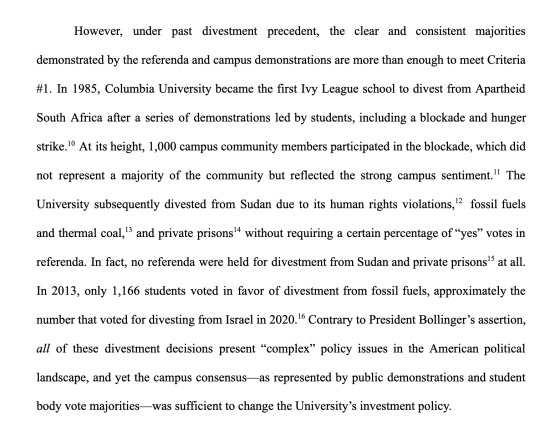
not exactly pie-in-the-sky stuff here. the apartheid protests resulted in successful divestment, and even the 1968 protests resulted in all demands met by the admin. it's a very practical goal. it's also one that happens to be morally righteous and just.
furthermore, i don't know where you have been for the past week, but who have you seen escalate the protests? the reason why there is now a worldwide protest movement is because, for the thousandth time, minouche shafik called the cops to arrest 108 students. the NYPD itself said the students were peaceful and offered no resistance whatsoever, even as police also arrested legal observers. it was not the intention of the protesters to get national or international attention. "hard wholeheartedly support the protests" is an exceedingly strange comment to make that i, frankly, have a hard time understanding. i find it extraordinarily easy to wholeheartedly support fellow graduate students and professors i personally know at multiple universities who are meeting the ire of a lying media, lying administration, and lying government in the form of a police baton for the crime of sitting on some university's lawn.
at this point, given the sheer level of violence the police has unleashed on students and faculty across the country for showing up to said lawns, a portion of the protest support for them stems from the defense of free speech.
additional demands in light of the arrests and suspensions include the reinstatement of SJP and SJVP and amnesty for all arrested. again, not absurd, not without precedent.
lastly, i invite you to go to a protest and see what's happening for yourself. at this point, there's bound to be one near you.
#it's exhausting seeing everyone learn about them exclusively through twitter videos GO TO ONE!#free palestine and free the university
194 notes
·
View notes
Text
Unlocking Academic Achievements: A Comprehensive Guide to All Bangladesh Examination Results
Introduction:
In the vibrant landscape of Bangladesh's educational system, the announcement of examination results is a momentous occasion that reverberates across the nation. Whether it's the Secondary School Certificate (SSC), Higher Secondary Certificate (HSC), or other specialized exams, the "All BD Result" serves as a crucial gateway for students, parents, and educators to gauge academic achievements and plan future endeavors. In this article, we delve into the significance of examination results in Bangladesh, the process of result publication, and the impact it has on the educational landscape.
The Significance of Examination Results:
Examination results in Bangladesh are not just numbers on a sheet of paper; they represent the culmination of years of hard work, dedication, and aspirations. For students, these results determine their academic trajectory, influencing their choices for further education and career paths. Parents eagerly await these outcomes, mirroring the dreams they have for their children. Additionally, the broader society observes these results as a barometer of the nation's educational health, reflecting the effectiveness of educational policies and the preparedness of future generations.
Types of Examinations and Result Publication:
Bangladesh conducts various examinations at different educational levels, each with its unique set of challenges and expectations. The Secondary School Certificate (SSC) and Higher Secondary Certificate (HSC) exams are among the most significant, serving as gateways to higher education. Additionally, there are specialized exams such as the Primary Education Completion (PEC) and Junior School Certificate (JSC) for primary and junior secondary levels.
The Bangladesh Education Board is responsible for conducting these exams and publishing the results. The process involves meticulous evaluation of answer scripts, followed by a comprehensive scrutiny to ensure accuracy. Once the results are compiled, they are made available to the public through the official websites of the respective education boards.
Online Platforms and Accessibility:
In recent years, the accessibility of examination results has been significantly enhanced through online platforms. The "All BD Result" website has become a central hub for students and parents to access results quickly and conveniently. This digital transformation has mitigated the challenges associated with traditional result publication methods, such as long queues and delays.
The Role of Technology in Result Publication:
The integration of technology in result publication has streamlined the entire process. Online portals not only provide quick access to individual results but also offer statistical analyses and comparisons across different regions and educational institutions. This transparency fosters healthy competition and motivates institutions to continually improve their academic standards.
Challenges in Result Publication:
While technological advancements have improved result accessibility, challenges persist. Technical glitches, server overloads, and other unforeseen issues can hinder the smooth dissemination of results. It is essential for education boards to continually upgrade their technological infrastructure to ensure a seamless experience for all stakeholders.
Impact on Higher Education:
Examination results play a pivotal role in shaping the higher education landscape in Bangladesh. Universities and colleges rely on these results to determine eligibility for admissions, scholarships, and various academic programs. As such, the accuracy and timeliness of result publication directly influence the futures of countless students seeking to further their education.
Embracing Continuous Improvement:
The examination results are not only a reflection of individual achievements but also indicative of the broader educational system's strengths and weaknesses. Educators, policymakers, and stakeholders must use the insights gained from these results to implement reforms and strategies that enhance the overall quality of education in Bangladesh.
Conclusion:
"All BD Result" is more than just a website or a set of numbers; it is a testament to the collective efforts of students, educators, and the education system at large. As Bangladesh continues to evolve and progress, the significance of accurate, timely, and accessible examination results cannot be overstated. By embracing technological advancements, addressing challenges, and using the results as a catalyst for positive change, the nation can build a robust educational framework that propels its citizens toward a brighter future.
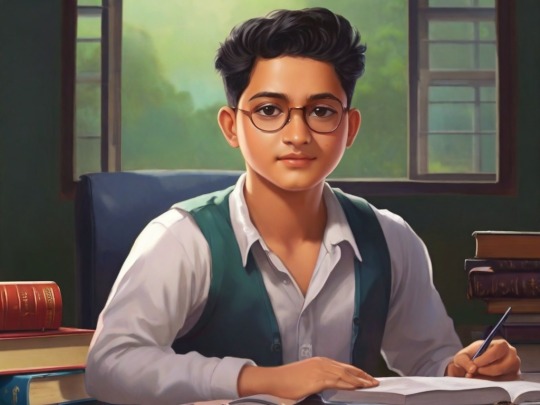
#bd result#ssc result#hsc result#nu result#nu result bd#ssc result bd#jsc result#psc result#ssc result 2019 bd#result#education board result#education board results bd#hsc result 2017#ssc result 2019#result bd#all result bd#bd all result#election result#bd results#nu ac bd result#bd results 24#nu edu bd result#bd psc result#jsc result bd#all result bd all board#bd exam result#exam result bd#nu result gov bd#exam result
0 notes
Note
bd!dabi and y/n’s reaction at parent teacher conference when the teacher says kaedes getting picked on
oh a parent teacher conference in general is absolutely chaos no matter what the results are but when it's a conference out of no where...that's different.
dabi immediately assumes that kaede got in trouble and he's a PROUD man "i know he'd turn out like me sooner or later, you're too soft." or something along the lines of that is stuff he'd say on the way but you're just confused because kaede's always been a good child, maybe he's just falling a little behind from his other classmates?
well, you were wrong. when his teacher told you that he was getting picked on, all you could do is sit there shocked and ask them how this even happened but dabi...oh he's already yelling. he's shouting, full-on threatening everyone even people who aren't even in the room "where is this brat!? where are their parents huh!" there is no calming him down now, he's going to keep yelling until he sees this kid's parents and even then he'll keep yelling.
when kaede finally is brought in the room, he has tears in his eyes and spilled milk all over his uniform that was in his arms, he was wearing his spares instead. and it just makes you begin to cry but dabi just gets even more enraged "how long has this even been happening?" he asks the teacher while you picked up your son who muttered to you that he wanted to go home.
"we don't know, we only saw it tod–" how!? they're five, how hard can it be to watch over them?" dabi yells as you run your fingers through kaede's hair, when you see that your boyfriend is getting too upset, you go to him and put your hand on his shoulder which at least draws his attention from his anger for a second.
a sigh leaves his throat "take him to the car." but you refuse "no, you take him." you said putting your child into dabi's arms. he tried to debate with you but ultimately you won, you didn't need him to fight every single person in this school and get kaede kicked out.
"kaede." dabi said and his crying son looked up at him with a quivering bottom lip "don't tell mommy but tonight we're gonna light that little fucker's house on fire." kaede gasped at his father's foul language "no cursing...and violent isn't nice." and dabi only sighed. even in a state of sobbing, kaede still remembered the things you taught him.
"fine...we're just gonna get that little...kid expelled. grandpa is useful after all." dabi said flashing his son a small smile making kaede giggle. dabi HATESSSSS talking to enji but, sometimes he can be useful and this is one of those times. thanks to you for forcing him to keep talking to his family.
#torasplanet.ᐟ#dabi x reader#mha dabi#babydaddy!dabi#grandpa enji is RICH#dabi's still gonna lit something on fire.#marls-drabbles.ᐟ#mha x reader
155 notes
·
View notes
Text
I think it’s interesting storytelling how in the beginning of the game Cal says the Sixth Sister’s name, Masana Tide, and reminds her of who she used to be—and it visibly distresses her because it hurts what was done to her and Cal isn’t wrong in what he’s saying. The shocking thing for me was the moment when Cal said “It’s time to set you free”. It was such a surreal feeling hearing Cal say that, those kinds of words, to know he decided it was time to strike her down; it’s understandable because she killed his entire crew, but for Cal to be the executioner in that way was scary to see coming after only experiencing the young kid he was in Fallen Order. Now you really get the feeling Cal has been through a lot, he’s grown as a man since Fallen Order and he’s calloused, not entirely in a bad way given he’d have to be to survive but still in a depressing way, as a result. I know overall and gameplay wise, Cal has killed a lot of people, it’s nothing new, but storytelling wise it’s a serious moment for Cal. It’s a moment you know is going to follow him the rest of the game for character development. After he kills her, it’s made clear by the music and by Cal’s body language that this isn’t a good thing coming from him. It isn’t a triumph. Even BD-1 knows and worries for Cal with his little “Boop…?” and Cal is only able to respond rather shakily, “Yeah… I’m okay”.
When he meets up with Bode and Bravo and they ask him what happened to the Inquisitor, he gives a simple, no emotion, “Dead”. The long pause of Bravo not saying anything in response to me says a lot; it feels like he isn’t used to Cal having a reaction like that.
Then we have Rayvis. Cal defeats him in battle and asks him to join in the fight against Dagan. He doesn’t want to kill Rayvis—“You don’t have to do this”. The oddly tragic part to me is that Rayvis has dreams of seeing Tanalorr again. If Dagan succeeds his dream will be realized, but he’s given up on the dream and wants a warrior’s death now. He wants to die, and in his mind, honorably, by Cal’s hands, and he’s going to force Cal to do it. But for Cal it’s another execution on his part. He pauses before he lifts his saber and kills Rayvis. It isn’t a triumph. Again we’re given a sudden swell of music to tell us the emotion behind the action of killing Rayvis. You can see it’s affected Cal badly. BD-1 seems to ask Cal the same question as before, “Boop…?” but this time Cal doesn’t acknowledge the question and just replies, “We should go”.
Killing Dagan hurts for Cal too. Dagan is a Jedi, someone who held onto the Order, who tied his entire identity to it and all of his goals are focused on restoring the Order and fighting to change the universe. Just like Cal in a way. Dagan is single-mindedly focused on the mission, so obsessively, he lost himself and the one he loved as a result. Cal understands and see the parallel of that kind of drive in his own mission against the Empire and it terrifies him. Dagan could’ve helped him fight the Empire but it became another tragic moment of having to kill a once fellow Jedi. This is another tragedy. Bode doesn’t care about Dagan being dead on the floor but Cal does. Cal has enough respect to place Dagan’s lightsaber on his chest. Cal pauses to reflect but Bode immediately gets back to getting the compass.
We have this interesting arch of reactions to killing his opponents. They were each killed for the mission. It was necessary. They each started the fight against him. No matter the reason though, it’s still very painful for Cal.
Cal is being pushed into this direction of forcing him to question his beliefs and who he is. His whole identity at this point has been tied to the Order, of being a Jedi, and it’s very clear by his conversations in Fallen Order that it really matters to who he is. By the end of Survivor, we have three fallen Jedi: Masana Tide, Dagan Gera, and Bode Akuna. So who is Cal Kestis? What will he become? Is he doomed to fall like they did? That’s what troubles him—“Let’s just say I don’t wanna end up like him [Dagan]”.
He’s afraid he’s going to lose himself.
The fear is almost realized when he’s about to kill another opponent. The one behind the murders of his friends and mentors. Cal’s been killing each of his main opponents up to the point at Nova Garon—this one will be no different. Except killing the man who sent Bode on the mission to infiltrate his team is different. Cal is on the edge of losing himself to the Dark Side. In Fallen Order he pleaded for Cere not to use the Dark Side because “She’s stronger than that”, “[she] still had a choice”. But Cal is failing to remember any of that for himself. He wants to kill because he’s angry, grieving, and in immense pain. Merrin has to bring him back—“This is not you!” There’s a question of whether or not Cal would’ve been able to stop himself if Merrin hadn’t been there though.
When we get to the final battle, Merrin is warning Cal of what’s likely going to happen but he ignores her for a while which prompts her to say, “Well? Say something!” He doesn’t want to acknowledge that Merrin is right and they’re likely going to have to kill Bode, and with that, taking Kata’s father away—a loss of family Cal and Merrin know too much about. So they both try and give Bode every chance to stop and turn away from what he’s done, despite how much Bode had hurt them. Sadly, Cal once again is forced into using the Dark Side to prevent Bode from killing Merrin. It was worth it. It was worth using it to save Merrin. He couldn’t let her be killed. He couldn’t see that happen before his eyes like he had with all of his friends and mentors.
After everything is over, there’s this sickly feeling left behind. Not simply because of Bode’s death, but because of the impact on Merrin realizing Kata has lost family just like she and Cal had, but also because of the impact the death of Bode has on Cal. And after Cal carries away Bode’s body, the music changes to an eerie, ominous, high pitch, minor key when we see Cal board the Mantis. The kind of change in music which lets the audience know there’s something seriously wrong. Things are different now. Cal’s different. And he knows it.
He’s lost in time watching the pyre, reflecting on everything that had happened but also on how grateful he is to Cere, but he knows the impact of her loss will continue to be with him for the rest of his life. Just like Jaro Tapal. Another guiding force in his life is gone. With Cere and Cordova gone, there is no longer any Jedi wisdom to seek out. He’s now alone in that way as a Jedi.
“I’m scared… I almost lost myself… I don’t know if I’m ready.”
Cal and the audience are left with the dreadful realization—
“I don’t know if I’m ready for what comes next”.
#legit don’t know what I’m taking about .#I honestly don’t want a third game cuz I’m scared#sorry for the ramble I really think about this game too much#I’ve only play it once but I gotta play it again so I can be traumatized a second time#thanks for listening to my Ted talk#mc talks#sobbing#cal kestis#jedi survivor#merrin#star wars#merrical#jedi fallen order#jedi survivor spoilers#nightsister merrin#greez dritus#jaro tapal#kata akuna#dagan gera#santari khri#rayvis#Jedi#I don’t want anything to happen to cal#I really really don’t#I have so much more to say about cal but imma try#*cry#I gotta stop writing this stuff in my phone
389 notes
·
View notes
Text
People of conscience around the world are rightfully shattered, enraged, and sometimes feeling powerless. Many feel compelled to boycott any and all products and services of companies tied in any way to Israel. The proliferation of extensive “boycott lists” on social media is an example of this. The question is how to make boycotts effective and actually have an impact in holding corporations accountable for their complicity in the suffering of Palestinians?
The BDS movement uses the historically successful method of targeted boycotts inspired by the South African anti-apartheid movement, the US Civil Rights movement, the Indian anti-colonial struggle, among others worldwide.
We must strategically focus on a relatively smaller number of carefully selected companies and products for maximum impact. Companies that play a clear and direct role in Israel’s crimes and where there is real potential for winning, as was the case with, among others, G4S, Veolia, Orange, Ben & Jerry’s and Pillsbury. Compelling such huge, complicit companies, through strategic and context-sensitive boycott and divestment campaigns, to end their complicity in Israeli apartheid and war crimes against Palestinians sends a very powerful message to hundreds of other complicit companies that “your time will come, so get out before it’s too late!”
Many of the prohibitively long lists going viral on social media do the exact opposite of this strategic and impactful approach. They include hundreds of companies, many without credible evidence of their connection to Israel’s regime of oppression against Palestinians, making them ineffective.
That being said, all peaceful popular efforts, including boycott and divestment, to hold all genuinely complicit corporations (and institutions) accountable for supporting Israel’s grave violations of Palestinian rights are justified and called for. It is perfectly legitimate, for instance, to boycott companies whose Israeli branch or franchise has supported Israel’s unfolding genocide in Gaza, some of which we mention below in the grassroots organic boycott targets section.
Also, a company or product may make perfect sense as a boycott target in one context or city but not another. This context-sensitivity is a key principle of our movement. Regardless, we all have limited human capacity, so we’d better use it in the most effective way to achieve meaningful, sustainable results that can truly contribute to Palestinian liberation. We therefore call on our supporters to strengthen our targeted campaigns and boycott the complicit companies named on our website to maximize our collective impact.
The following are the current top priority boycott targets of the global BDS movement.
179 notes
·
View notes
Text
The First Slam Dunk fansub
Proud to release my very first fansub for the return of Animation Night.
So what is this movie? The short version is that The First Slam Dunk is the best sports movie I've ever seen.
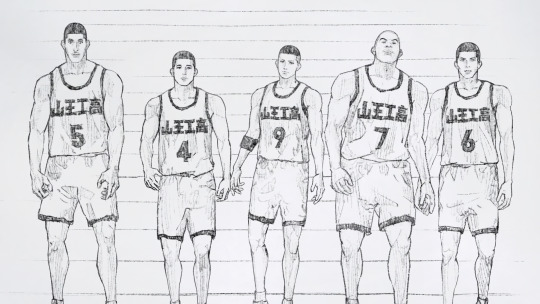
A slightly longer version: it's an incredibly intense, sharply choreographed game of basketball - intercut with the story of our boy Ryota, who struggles to live up to the shadow of his dead brother Sota, not helped by the fact that his mother is not dealing with it well. Growing up a taciturn outcast, Ryota at last finds solace in basketball, where he finds a new purpose as he and his comrades in the no-name Shohoku basketball team find their way to unexpected success. Now, he stands to achieve his brother's dream - to beat the as-yet undefeated Sannoh team. But the Sannoh boys want that win just as badly, and they live for basketball.
After seeing this movie you'll get why.
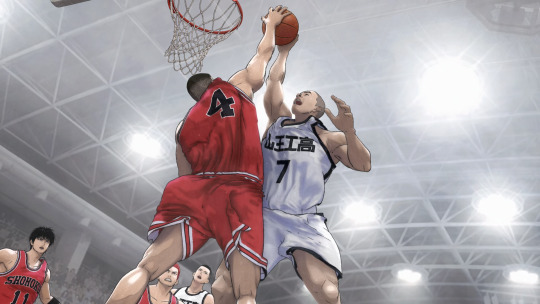
Slam Dunk is a wildly popular and long-running sports manga, previously adapted to anime by Toei in the 90s. The original story followed delinquent yankii goofball Sakuragi, who finds a new life in basketball. This movie aims to open it to a new audience - it retells the story from a different perspective, changing the emotional beats as it moves our view from goofy Sakuragi to troubled Ryota. The original mangaka Takehiko Inoue directed it after he was impressed by Toei's efforts to bring the characters to life with CG. It sports (haha) a unique look in anime, blending 2D and 3D animation with a really gorgeous manga-like shading style and effects.
The result is a film with the tight cinematography of manga panelling, the complex 3D motion of CGI and mocap, and also the clarity and snappy timing of animation. The result is, above all, readable. I honestly don't know a thing about basketball, and yet, I could follow every move - even in French.

Then add an absolutely killer soundtrack and masterful pacing and you end up with something truly special. It was one of my favourite movies at Annecy last year, and now it's finally out on BD.
So, in the interest of letting more people enjoy this movie, and also because I really wanted to try my hand at it, I made a fansub! It ended up an incredibly involved project - I retimed every line of dialogue, tracked dozens of signs in Blender, and generally went just completely all out on this one. Couple of all nighters may have been involved.
Here's some screenshots of some of the more complex typesetting:
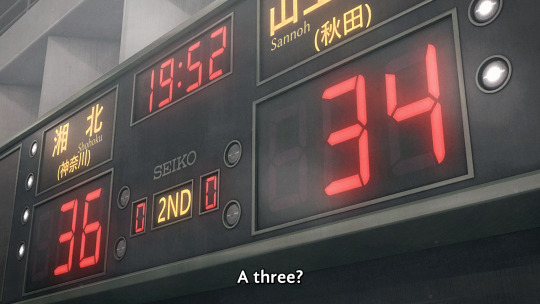
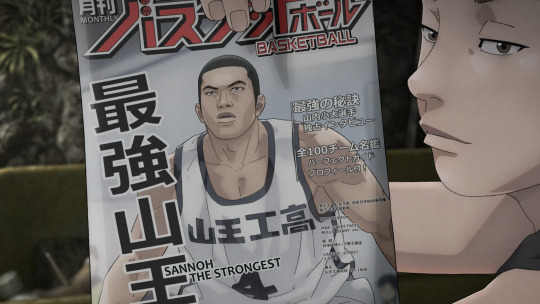

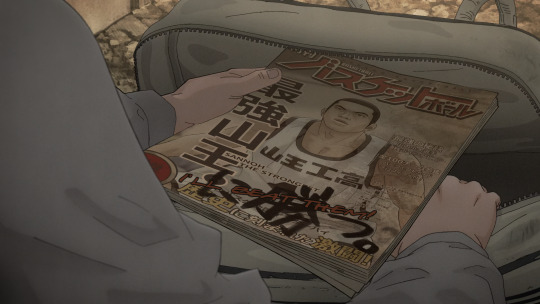

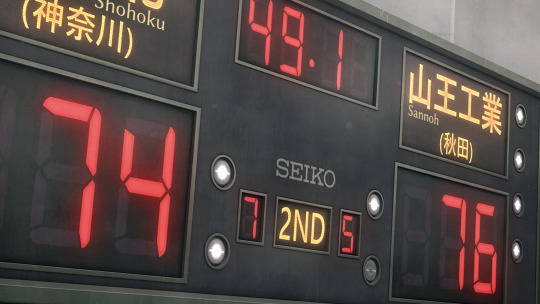
If you'd like to watch it together, I'll be staging a group watch at 7pm UK time (three and a half hours from now). Tune in to twitch.tv/canmom - I'd love to see you there! And if not, well, the torrent is above, enjoy <3
97 notes
·
View notes
Note
I am not Palestinian nor am I Jewish. Be that as it may, I hate settler colonialism, even more so as a brown, bi, genderqueer ‘Afab’ person. I just wanted to say. 1) your post on the topic is more empathetic and insightful than I’ve seen a lot of people be about this over my entire life and I’ve asked questions of both sides, I tend to stay out of the fray cause I don’t feel it my place to speak over Palestinians and Jews (who are critical of Israel). But, do you have any advice for being a better ally to Palestinians and combating anti-semitism and anti Jewish racism in the everyday?
hey sweetheart! thank you for your commitment to the movement and your earnestness. i am not Palestinian or Jewish either, so i did what is always considered best: i asked those who are! that's exactly why our Advocacy Committee within BFP exists :)
from one of our Palestinian youth volunteers:
if you have the money to do so, donate to the cause! the unfortunate truth is that to gain access to various resources, things cost money. more specifically, donate to humanitarian aid funds you've done the research for and are sure are doing work on the ground. even better if you can donate directly to those being affected! this includes Palestinians on the ground but also within the diaspora who need self care items, especially for all the work they've been doing educating others. for example, this is an organization this member volunteers with and trusts:
and these are two amazon lists of Palestinian youth within the diaspora:
share posts by Palestinians! the big thing is really just getting the word out, sharing their perspective. Zionist propaganda is hard to penetrate so the least we can do is uplift their voices by sharing!
from one of our Jewish youth volunteers:
understand that not all Jewish people are Zionists and not all Zionists are Jewish. saying the two are equivalent is not only antisemitic but ignores the blatant statistics, like the growing number of anti-Zionist Jewish young adults in the united states for example, or the fact that the biggest supporters of israel are actually evangelicals.
to that same point, know that israel has been purposefully trying to conflate the two in order to then label anyone who does critique the state as automatically antisemitic. it is a tool.
additionally, be careful with the rhetoric you choose to spread & subscribe to (i.e., watch how they describe israel. do they refer to the people as Jews or Zionists? it can tell you a lot about how educated they are and their vague stance on the matter)
my own additions as a longstanding ally and friend of those involved:
learn your history! there is a clear attempt to distort the history of Palestine. learn what Palestine was like before israel's occupation. learn about the way pioneering Zionists openly called Zionism "colonialism" and didn't even try to hide it. learn about how discussions of the Zionist project were discussed roughly 80 years before the Holocaust ever happened. this does not mean that some Jews did not, in fact, move to Palestine in response to such a horrific event, but in the words of a Jewish mutual of mine, israel's rhetoric literally weaponizes Jewish trauma by conflating these two dates in history.
BDS movement! stands for boycott, divestment, and sanctions!
when possible, actually speak to people of Palestinian descent. like seriously. posts are great, but actually speaking to people who are knowledgeable in real time can be so helpful for getting your questions addressed, so long as you are respectful, of course. a great place to do this, not even to advertise, is actually our Discord server linked in our bio @bfpnola
know that language matters, as inconsequential as it may seem. in the words of my Palestinian, Kashmiri, and Artsakhi friends and/or mutuals, when speaking of occupations, we capitalize the occupied people's country (ex. Palestine) while not doing so for the occupier's (ex. israel) to delegitimize them.
learn about Hamas and its history/purpose. here are my notes on two podcast episodes let by Palestinians:
thank you for your ask! im sure i may think of other things later but these are my answers for now.
-- reaux (she/they)
#reaux answers#free palestine#palestine#israel#gaza#allyship#mutual aid#antisemitism#jewish#anti zionism#resources#donations#donate
147 notes
·
View notes